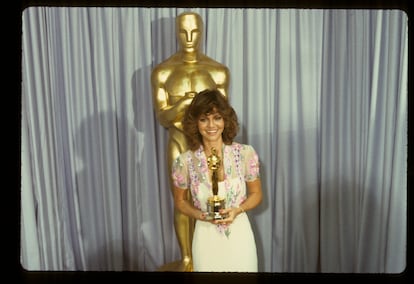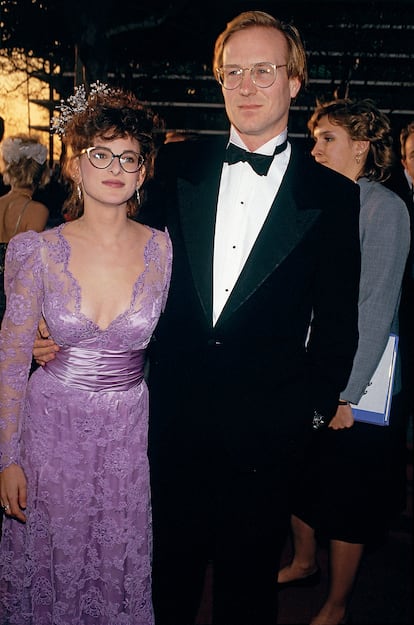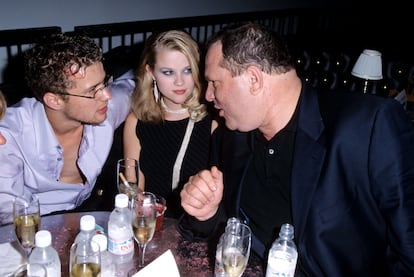Men who don’t love women who win Oscars: ‘When I found out that he didn’t win, my heart sank’
Recent confessions from two Oscar-winners give new life to claims that women’s professional success can lead to negative impacts when it comes to their personal life

It’s currently the talk of Hollywood, one of its most bizarre legends: the Oscar love curse. The phrase was coined a decade ago by various publications, and refers to the phenomenon in which an actress wins the statuette only to see her triumph followed shortly after by a breakup or divorce. It’s a straightforward archetype born from misogyny, that of the woman who puts her career before her partner, a victim of her talent’s curse, and it’s recently managed to permeate public debate. So much so, that to figure out if there was any truth to the curse, researchers from Toronto University and Carnegie Mellon University carried out a study in which they analyzed the cases of 751 performers who were nominated for an Oscar in the categories of Best Actor and Best Actress from 1936 to 2010. Their conclusion? Female winners of the award were 68% more likely to see the end of their relationship as non-winners. And now, two actresses have added fuel to the flame with recently-published first-person accounts.
“He really was not a nice guy around me then,” two-time Oscar winner Sally Field revealed in the book 50 Oscar Nights (Dave Karger) that her former partner and celebrated actor Burt Reynolds “was not happy” when her name began to be mentioned in the running for her first Oscar, and made it clear that he would not accompany her to the gala. Field had been with the late actor for five years, but their relationship started showing cracks when she won the award in 1980 for her work on the film Norma Rae. Previously, Reynolds had also refused to travel with her to the movie’s Cannes Film Festival screening. “He said, ‘You don’t think you’re going to win anything, do you?’” says the 77-year-old actress.

The big night was an even harsher experience for Marlee Matlin, who is known for such films as CODA. On March 30, 1987, Matlin made history by becoming the first Deaf actress — and one of the youngest of all time, at the age of 21 — to win an Oscar for her role in the romantic drama Children of a Lesser God. Her co-star in the film, William Hurt, who was also her romantic partner at the time, was not awarded the statuette for which he had been nominated as Best Actor. “When I found out that he didn’t win, my heart sank. I was afraid to see how he was going to react later at home, the fact that I won and he didn’t,” she explains in 50 Oscar Nights. Matlin recalls that Hurt was very quiet and pensive on the way from the awards ceremony, until he broke his silence to reproach her. “He said, ‘So you have that little man there next to you. What makes you think you deserve it?’ I looked at him like, ‘What do you mean?’ And he said, ‘A lot of people work a long time, especially the ones you were nominated with, for a lot of years to get what you got with one film.’ I was too stunned to talk. But it made me stronger. It just bounced off my back. It was my time. It was my night. And it was the beginning of my career.” Matlin broke off the relationship with Hurt a few months later.
Carlos García, relationship coach and couples therapy specialist, says that this kind of Hollywood reactions and behaviors are more common among mere mortals than it may seem. Due to cultural stereotypes associated with the most classic — or rancid — masculinity, like power, leadership, protection and strength, a certain kind of man can feel offended and be unable to handle the fact that their wife is more successful and acclaimed than they are. “This is what happens to Hollywood actresses,” García explains, “whose husbands and boyfriends flee the relationship because they are unable to play the role of the savior prince that they and others around them have so often played. They call it the ‘Oscar love curse’ but it happens at all levels: I have seen men offended because their name appears second in the mail they receive at home.”

The list of Oscar winners who have seen their professional climax be accompanied by sentimental drama is extensive. Helen Hunt, Gwyneth Paltrow, Julia Roberts, Charlize Theron, Hilary Swank, Rachel Weisz, Jennifer Hudson.... Sometimes, the problem can stem from pure vanity, as in the case of Kate Winslet, whose award for The Reader created tension between her and her husband at the time, director Sam Mendes, who has been referred to by the British press as Mr. Ego and who was also in the running at the Oscars that year for his work on Revolutionary Road. At other times, professional jealousy and the gender pay gap play roles, as they did in the case of Reese Witherspoon (Walk the Line) and Ryan Phillippe. While the couple presented the Oscar for Best Makeup together in 2002, Phillippe went off-script, on the air, saying that he wouldn’t read the winner because he wasn’t paid enough to do so: “You make more than I do, go ahead,” he told his wife. Over the years, Witherspoon confessed that the moment left her completely baffled. Her former husband had never told her he was planning to say something like that. She added, “Don’t ever feel ashamed of a woman making money.”
Third parties can also come into play when it comes to Oscar-related sentimental drama, as happened in the situations of Sandra Bullock and Halle Berry, who dedicated their wins to their respective partners on the Kodak Theatre stage at the same moment that tabloids were working on exclusives detailing their spouses’ infidelity. Bullock’s experience was particularly cruel: she went from bathing in the brilliance of her Oscar win for her work on The Blind Side to seeing her husband’s mistress spill the details of their affair on a magazine cover just 10 days later.
In recent years, the curse’s power seems to have diminished, perhaps due to economic and cultural changes associated with the rise of feminism in Hollywood. The number of marriages in which women are the primary breadwinners has tripled over the last 50 years, and has had a decisive impact on diminishing the stigma of the successful woman within a romantic relationship. According to the Wall Street Journal, in the 1960s and ‘70s, there was a 70% greater chance of divorce among couples in which the wife earned more than the husband. That figure, decades later, has dropped to 4%.
However, the sense that female success is still perceived as a threat to men is alive and well in entertainment. Last year, there have been two high-profile examples of this in the world of pop stars: Taylor Swift and Ariana Grande. According to sources close to the singers, the inability of their former respective partners, Joe Alwyn and Dalton Gomez, to accept their higher profiles was a key factor in their breakups. As Swift suggested in her hit Midnight Rain: “He wanted it comfortable, I wanted that pain / He wanted a bride, I was making my own name.” Just a few days ago, fellow vocalist Kelly Clarkson revealed that her now ex-husband, Brandon Blackstock, had discouraged her from accepting a coaching role on the U.S. edition of The Voice because she wasn’t “sexy enough.”
In conclusion, García hopes that in the future, we’ll have new models of masculinity that allow us to see the end of such bad behavior. “Perhaps a somewhat more tolerant approach, more egalitarian in the roles that allow us to understand people, regardless of their gender. The world has already lost many centuries of women’s literature and philosophical reflection, and men have lost the opportunity to live some of their emotions more fully.” Not to mention, the opportunity to celebrate their loved one winning an Oscar.
Sign up for our weekly newsletter to get more English-language news coverage from EL PAÍS USA Edition
Tu suscripción se está usando en otro dispositivo
¿Quieres añadir otro usuario a tu suscripción?
Si continúas leyendo en este dispositivo, no se podrá leer en el otro.
FlechaTu suscripción se está usando en otro dispositivo y solo puedes acceder a EL PAÍS desde un dispositivo a la vez.
Si quieres compartir tu cuenta, cambia tu suscripción a la modalidad Premium, así podrás añadir otro usuario. Cada uno accederá con su propia cuenta de email, lo que os permitirá personalizar vuestra experiencia en EL PAÍS.
¿Tienes una suscripción de empresa? Accede aquí para contratar más cuentas.
En el caso de no saber quién está usando tu cuenta, te recomendamos cambiar tu contraseña aquí.
Si decides continuar compartiendo tu cuenta, este mensaje se mostrará en tu dispositivo y en el de la otra persona que está usando tu cuenta de forma indefinida, afectando a tu experiencia de lectura. Puedes consultar aquí los términos y condiciones de la suscripción digital.









































